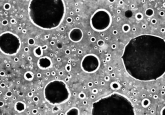Novel self-powered microfluidic device detects cancer biomarkers using pump
Self-powered ‘place n play’ pump enables point-of-care, microliter detection of cancer biomarkers.
Researchers from Shanghai Institute of Microsystem and Information Technology at the Chinese Academy of Sciences have recently developed a portable point-of-care testing device capable of detecting cancer biomarkers in only microliter volumes of blood.
The system was set up to automatically extract blood plasma from less than 3 µl of whole blood while performing a multiplex sample-to-answer nano-ELISA assay without the use of external power, performed through the use of a PnP polydimethylsiloxane pump. The system was able to detect the CEA model biomarker at a concentration of 50pg/ml and CYFRA21-1model biomarker at a concentration of 60pg/ml, within 60 minutes.
The device is suitable for low-technology, rural or field conditions of use and results can be read with the naked eye. The team, led by Gang Li, reports the device as an inexpensive and easy to use microfluidic tool, allowing for the fast analysis of fluids and non-turbulent flows, all with a small footprint. “Our device is well-suited to helping early diagnosis in resource-limited settings where no mechanical pumps are readily available because it is portable, affordable, sensitive, specific and delivered by technology with a user-friendly analytical platform,” said Li. The device is still being developed.
Source: Zhang H, Li G, Liao L et al. Direct detection of cancer biomarkers in blood using a “place n play” modular PDMS pump. Biomicrofluidics (2013) (E-Pub ahead of print).



